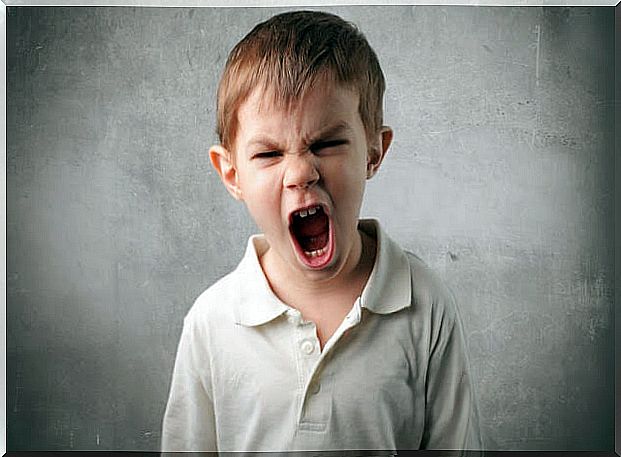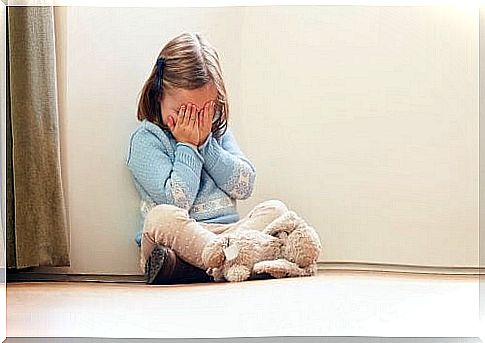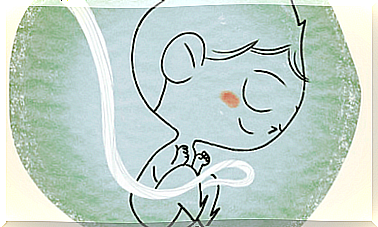Talking To An Angry Child: 8 Keys To Do It

Talking to an angry child is almost never an easy task. Normally, an outburst of anger occurs in which it is impossible to negotiate, argue or explain; their anger prevents them from hearing what is being said to them. What to do in these cases?
Keys to talking to an angry child
Talking to an angry child can be very difficult because parents don’t know how to react at such a time. The common thing is that if the child gets angry and begins to cry and even throws an object, he loses patience and is yelled at or severely punished.
Before getting carried away by the rage of the moment, parents should pay attention to some advice given by the best specialists in positive discipline so that the relationship with the child does not deteriorate and there is good communication.

1.- Avoid abuse
When children display outbursts of anger, parents tend to resort to spanking, yelling, punishing, or an authoritarian tone that can begin to cause a breakdown in the family relationship. It happens that children are clever and have the ability to understand quite well what is being said to them.
So, it is advisable to always instill in the child values such as respect and always treat them with affection. Of course, this does not mean that they should not be disciplined, which is also a fundamental part of their training.
Some people think that spanking or physical abuse is essential in the child’s education or that discipline means using the hands to try to make him understand that what he has done is not right, but there is nothing further from the truth.
2.- Take care of them emotionally
At an early age, children’s emotions run high, so logically they don’t have the self-control that most adults have. Because of this, they express their anger or frustration on a recurring basis and usually throw themselves on the ground, kick, or yell.
Now, it is the father or mother who must lead by example by controlling themselves and not exploding in anger so as not to react abruptly, as this could affect them emotionally and create trauma in the future.
3.- Set an example
It is a serious mistake to think that constantly yelling at children will help them control their emotions at such times. Parents should be the first to handle anger because violent gestures are setting a bad example for children.
They are in the process of formation, so observing the behavior of their parents can leave a deep impression on them that will make them imitate them in moments of anger.
If instead of shouting something like: “Lower your voice, please, I can’t understand you, can you tell me without shouting what is happening to you and we can solve it?” Doing so will ease the tension of the moment and help you argue with him easily.

4.- Listen to it
If the child is trying to talk about what has bothered him, he may try to do it by screaming or through tears and that can cause despair. However, staying calm and coming down to his level by asking calmly to explain what has happened to him will create a conducive environment in which he feels heard and cared for.
By doing so, the anger will diminish as solutions are offered to the discomfort that has arisen. Avoid ignoring or responding sarcastically and try to show affection and interest. This will allow the little one to respond positively.
5.- Dramatize
This does not mean that you have to give in to all the whims and dislikes of the child. There is a point of balance. If the child is frequently angry about unimportant things, he should not be given the reason, always trying not to make a fuss about something of little importance.
6.- Stop the aggressiveness
If you start hitting and completely lose your temper, it can be very difficult to talk to an angry child. In this case, it is advisable to hold his arms and look him in the eyes, calmly telling him that this type of behavior is not allowed at home. You must be firm and forceful when doing it.
7.- Breathe deeply
When the child does not want to do what has been asked, instead of answering and yelling at him, it is best to walk away for a second and return calmly.
It is recommended to use positive discipline, such as: “Okay, you have decided that you are not going to pick them up, so the decision is that later you will not be able to play with them.”
8.- Speak calmly
Explaining lovingly that you are understanding what the child is feeling is a good way to relieve tension. Telling them that parents sometimes get angry and exhausted, but that they don’t yell and throw tantrums will help them reason.
Talking to an angry child gently will help calm things down. Even giving him a caress, a mime, a hug or a sweet gesture will help reassure him, since he may only be attracting attention in the moment because he wants love.
Employing positive discipline is one of the best alternatives offered by specialists in family therapy; always trying to find the best alternatives for the child to come to his senses.










